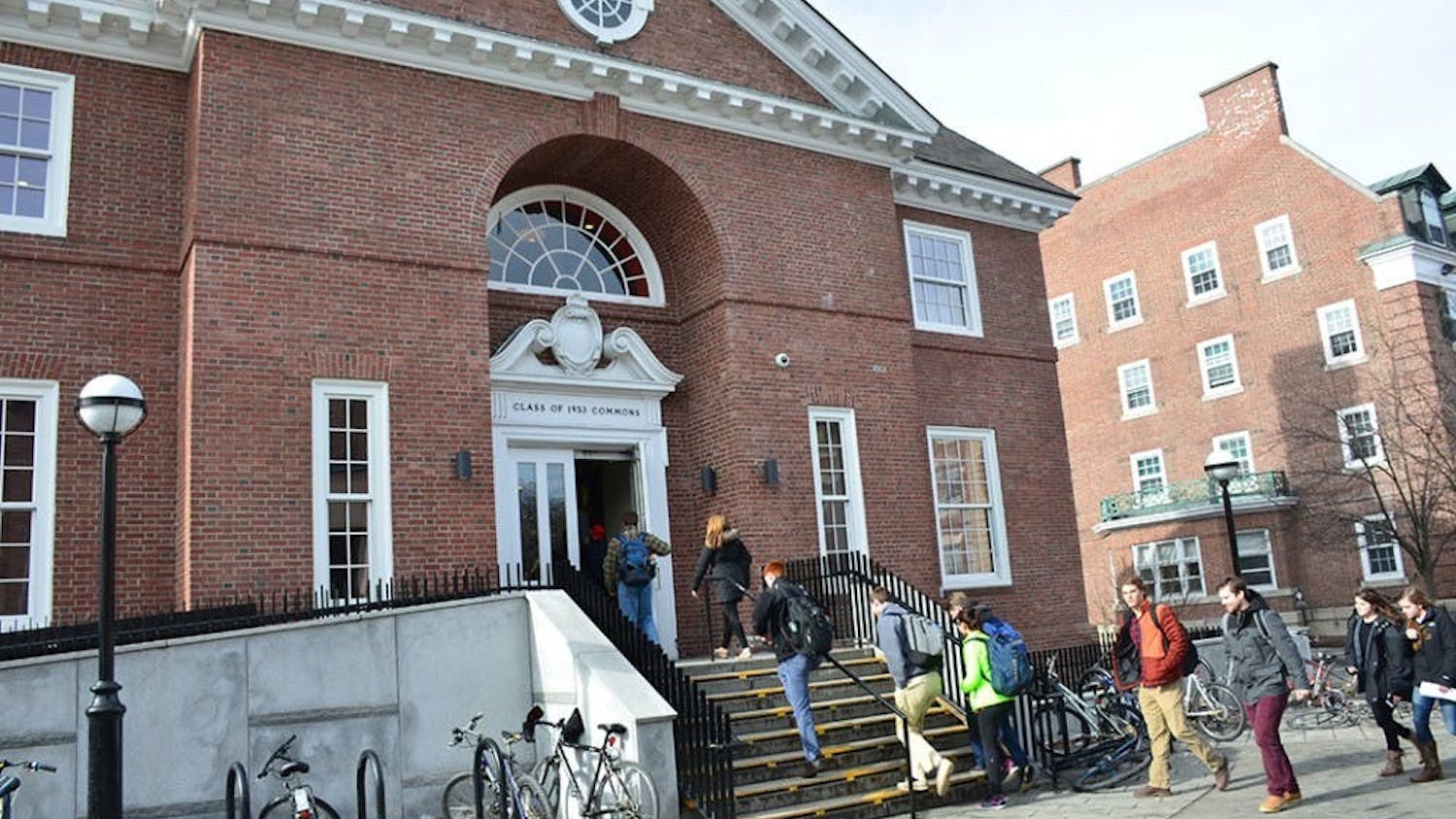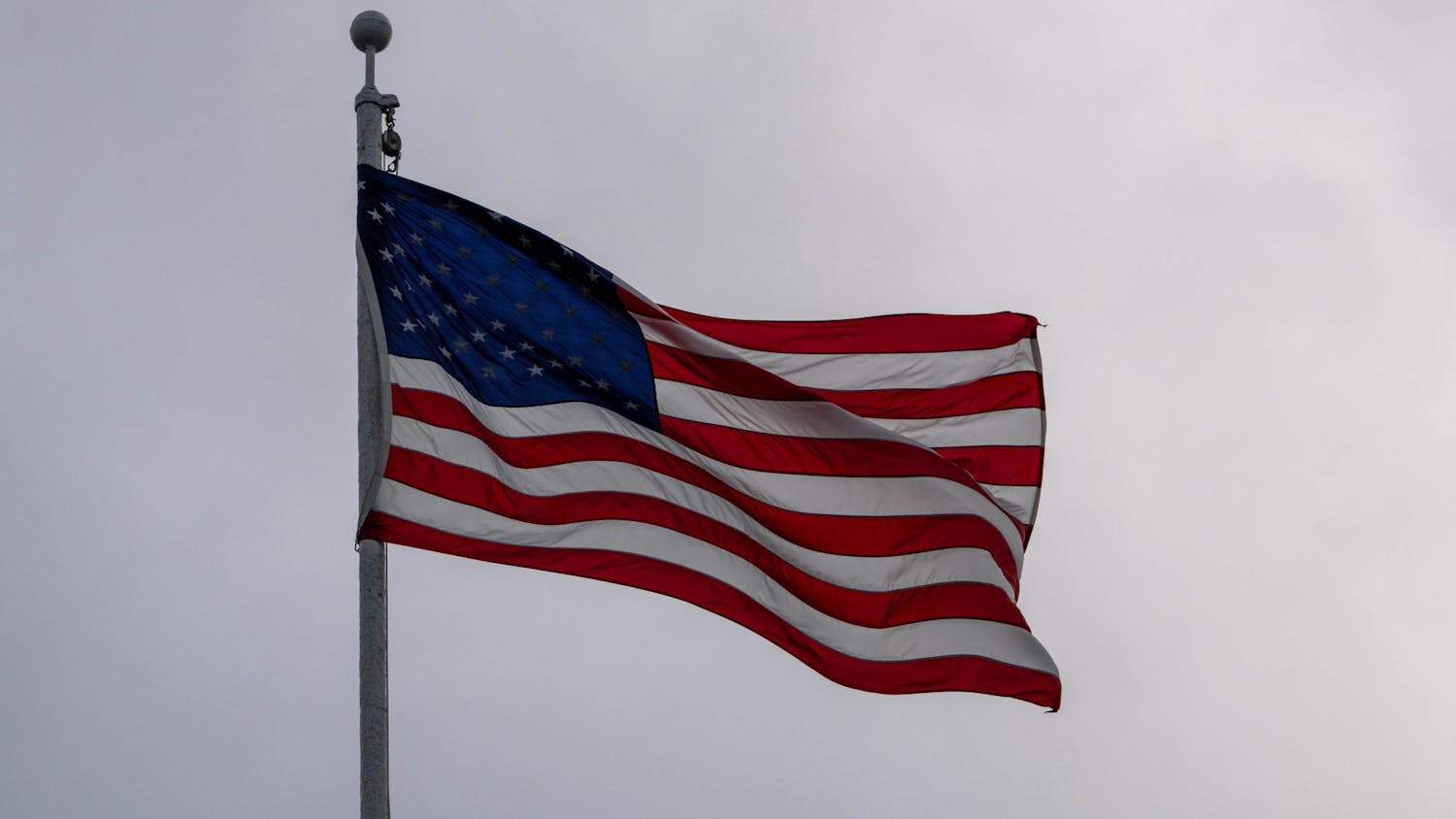In the early hours of Thursday morning, a large piece of plywood with the Dartmouth Indian head painted on it and a sign that read “WE stand with NAD. We say ENOUGH” were placed on the steps of Dartmouth Hall. The piece of plywood — a pong table — also included the words “Boom Boom Lodge,” a slang phrase used to refer to Theta Delta Chi fraternity and its physical building.
The sign also said the Dartmouth Indian “seeps from our basements, to our minds, to our hearts” and that it “dehumanizes cultures, and individuals.” The Dartmouth Indian “makes people afraid” and “is racist,” the sign read.
Theta Delt’s letters were written on a piece of paper attached to the plywood. Gamma Delta Chi fraternity’s letters were also posted on the board on a piece of paper.
The act was carried out by a group of “concerned upperclasswomen.” A statement sent to The Dartmouth that was cosigned by “Concerned Upperclasswomen of Dartmouth” said the group is “committed to exposing the deep-seeded racial injustices of this institution.”
The statement was sent in an email by an anonymous member of the Class of 2016 on behalf of the group. The student was granted anonymity due to concerns over legal repercussions.
NAD — the Native Americans at Dartmouth — was not officially involved in the incident.
NAD historian Bridget-Kate Sixkiller McNulty ’16 wrote in an email that the organization and its representatives declined to comment because NAD was uninvolved in the incident.
An investigation into the incident is currently underway, Safety and Security director Harry Kinne said. The plywood, signs and a College-owned camera were removed from Dartmouth Hall and secured by Safety and Security officers, he said.
A piece of plywood was reported stolen by an organization — which Kinne did not identify — although it was not necessarily the same piece of plywood, Kinne said.
“We haven’t made a conclusion as to whether this is the reported stolen piece of property at this time,” he said.
The plywood and signs were removed because they were not officially allowed to be positioned on the steps, Kinne said.
“There are no banners or that type of thing that are allowed to be placed on the campus, so it was removed because of the fact that no one had gained approval to have it there,” he said.
Kinne declined to comment on the ongoing investigation being conducted by Safety and Security. Currently, Safety and Security is attempting to find the last individual in possession of the College-owned camera and also locate any other potential witnesses, he said.
The statement from the group of upperclasswomen discussed a “rigged” system against marginalized groups — particularly Native students — and criticized biases and racism within the Greek system and Dartmouth as a whole.
Additionally, the statement highlighted specific iconography on campus as offensive to Native students, including the basement of Theta Delt, parts of GDX, the Hovey Murals, the weathervane on Baker Tower, the Paganucci Lounge in the Class of 1953 Commons, the basement of the now-derecognized Alpha Delta fraternity, the Tower Room, the College President’s office and the third floor of Psi Upsilon fraternity.
The statement criticized campus reaction to the imagery on the grounds that it was directed at NAD.
“What does it say that we as a ‘Dartmouth community’ expect the only people who care about racism to be the victims of racism?” the statement asked.
Student Assembly President Frank Cunningham ’16 said that following the incident, he was most concerned about the backlash toward the NAD community, since they were not involved. He said that this community continues to experience hardship on campus, and that it is “a true problem that this Indian mascot still exists here at Dartmouth.”
Members of Theta Delt could potentially feel threatened by the incident, Greek Leadership Council accountability chair Taylor Watson ’16 said.
“If [Theta Delts] say they feel specifically unsafe, we can’t deny that and say ‘No you don’t,’ but I think it’s less ‘You broke in and stole something’ than ‘You broke in and stole something and used it to attack us,’” he said.
Since fraternities are relatively public spaces, it is possible for non-members to enter somewhat easily, which can be challenging for those living in the house, he said.
The GLC is considering amending its constitution to ban the Dartmouth Indian in all GLC houses, Watson said. Such a measure would require the presidents of all Greek houses to vote to amend the constitution. All the Greek presidents met on Wednesday night but the constitution was not amended after the issue was discussed, he said. It may arise again in future.
The statement from the group of concerned upperclasswomen criticized the GLC for failing to adopt the constitutional amendment that would fine Greek organizations for any depiction of the Dartmouth Indian.
“Prominent members of the Greek system have been directly involved in generating this racist imagery,” the statement read.
A major issue is the right of individuals to wear the symbol, Watson said. While the display of the Dartmouth Indian in a private room or on a T-shirt is not the purview of the GLC, a T-shirt displaying the Indian alongside a house’s Greek letters or a display of the Indian in a public place could be problematic, he said.
Chi Heorot fraternity recently removed all Dartmouth Indian-related apparel from its premises, Watson said.
Cunningham said he supports the movement to ban the Dartmouth Indian from GLC organizations because it would make Greek spaces more inclusive to all students.
The incident follows the posting of flyers across Dartmouth residents halls last month. The flyers — which encouraged students to “celebrate Columbus Day all year” with “vintage” apparel featuring the Dartmouth Indian — were removed by mainly Native students shortly after they were posted.
Many campus groups expressed outrage at the incident, which was reported to administrators as a bias incident.
After the first incident, Sixkiller McNulty said some Native students did not feel safe on campus.
“It is horrifying that students do not feel safe on their own college campus, do not feel free to walk around because other students have decided to intimidate and scare them,” Sixkiller McNulty said at the time.
When the flyers were posted, 56 Native high school seniors were visiting campus as part of the Native American Community Program and saw the flyers.
The GLC condemned the first incident in a campus-wide email and may take similar action for the more recent incident, Watson said. However, the GLC can only speak for itself and not for the Greek system as a whole, he said.
Theta Delt president Curtis Oberg ’16 did not respond to a request seeking comment. Interfraternity Council president Sam Macomber ’16 declined to comment, citing the fact that he was not in Hanover and was not comfortable speaking on the matter until he discussed it with IFC officials at Dartmouth.



